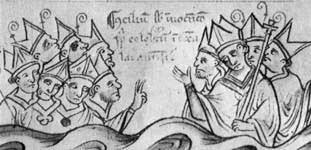1215: Effect of Fourth Lateran Council on Christian Belief
 Episode 6 Canons for Christian Practice and Belief
Episode 6 Canons for Christian Practice and Belief
1215: Years That Changed History
Dr Dorsey Armstrong (2019)
Film Review
Prior to listening to this lecture, I was unaware that most of the major doctrines associated with Catholicism were enacted by the Fourth Lateran Council in 1215. In addition to making marriage a compulsory church requirement (for children to legally inherit from their biologic fathers), the Fourth Lateran Council made the celibacy of priests compulsory.
Among other canons it enacted were
acknowledgement of the Cistercians (founded 1098), Franciscans (1209) and Dominicans (founded 1216) as official monastic orders*compulsory yearly attendance at confession and mass (usually at Easter)**compulsory belief in transubstantiation (non-belief was a heresy punishable by execution)a ban on participation of monks, priests and nuns in commercial traderequirement for each church to hire a master to provide free formal instruction to would-be priests for free (opening access to the priesthood for the poor)*The first monastic order, the Benedictines (founded 529 AD) were highly involved in local government and commerce, and the other three were founded, in part, in reaction to the former’s over involvement in commercial activities. The Franciscans and Dominicans were mendicant orders. They wandered around with begging bowls to reach out to people who most needed them.
**This cannon was enacted in part in response to rural peasants who were incorporating pagan rituals into planting and harvest festivals.
Film can be viewed free with a library card on Kanopy.
The Most Revolutionary Act
- Stuart Jeanne Bramhall's profile
- 11 followers



